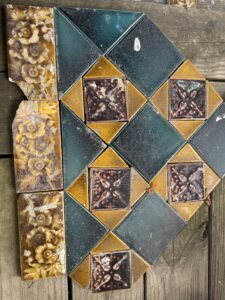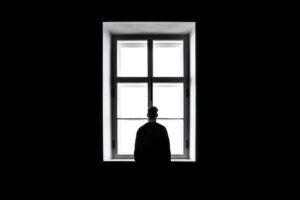On August 15, 2022, also release day for Kidnapped in Haiti, I resigned from my “as needed” post on the medical floor at Elkhart General Hospital after over ten years of working as a nurse. I had only been working occasionally anyway, hardly enough to keep up-to-date. With a sixteen-month-old daughter, Kidnapped in Haiti releasing and the Brady Street Boys middle grade adventure series in progress, we decided that we have enough on our schedule without disrupting it further with strenuous night shifts.
My last nights in the hospital reminded me of the things I love about working as a nurse, and even about night shift. The aroma of coffee drifting down the hall at 2am. The darkened corridors and reduced staff. The instant trust most patients place in the nurse, even one they have never met before. The hope that sunrise brings on the dark horizon (especially that day shift will arrive soon).
In honor of my colleagues who carry on, at times with feet aching and brains fuzzy with sleep deprivation, I want to share an account from a shift not long ago, with details and names changed for privacy (if you think you know who this is, it’s almost certainly a sign that you don’t). First a word about the strangeness of the modern world.
Aren’t Medical Professionals Mostly Corrupt?
We live in a strange world now. People applaud the medical advice of beautiful extroverts on Instagram. They promote their own “research” on the internet (technically Googling isn’t research, although I have called it that too). Yet many ridicule someone who has studied medicine for many years and actually done real research. (I’m not speaking of myself; nurses don’t study medicine. They study nursing.)
I’m not at all against sharing great health tips among non-medical people. But if that Instagram star or internet researcher falls off a roof and impales an elbow on a metal stake, drinking vinegar or popping vitamins won’t prevent death from tetanus or sepsis. Even the noble B&W ointment (which I love) won’t return a fractured elbow to good working condition.
Is there corruption out there? I’m sure. Have I met corrupted doctors who are out to keep people from true health? In my work in heart surgery I interacted with dozens, maybe hundreds of doctors and I don’t think any of them fit that description. Perhaps some of them are motivated by avoiding lawsuits, but I just haven’t seen physicians who don’t want their patients to get well. Grouchy? Yes. Arrogant? Absolutely. Focused on their specialty rather than the whole person? Certainly. But I found myself amazed at how troubled physicians became when their patients were doing poorly. And how just plain brilliant most of them were.
In the last decade, I’ve seen nurses care for people who demand unreasonable attention and lots of Coke. I’ve listened to patients scream obscenities at medical professionals and storm away in their hospital gowns, leaving against medical advice. I’ve watched government mandates crack down on doctors and nurses, generally with good intent but even more paperwork. I’ve seen medical professionals exhausted and frustrated and hungry, knowing that they will catch only a few hours of sleep before returning for more punishment.
And I’ve seen amazing things happen, like that night when I heard a shout across the hall.
The Man With the Broken Elbow
“Help! I need help in here!”
“Coming!” I raced across the nurses’ station, meeting the other nurse in the doorway to the room. Our assistant, the CNA, bent over a form slumped on the bed rail.
I had heard this patient chatting with the CNA moments before as the night shift began.
“Shall I get you a warm blanket for the night?” she had asked.
“Why yes, that sounds like a great idea,” he said. “Thank you.” Unlike some of the patients we care for who are garbled, drowsy, whiny, or desperately sick, this man was flat out nice and doing well. He had undergone a surgery to repair a fractured elbow, and surely should have been discharged soon, hopefully in time to enjoy a burger for the fourth of July.
Now, seconds later, he was unresponsive.
While his primary nurse assessed the situation, I called the charge nurse. My message was brief; my tone of voice communicated more than the words.
“We need you over here now.”
“Okay.” She didn’t ask questions. I didn’t work with her much, but she understood me perfectly.
I hurried back into the room to see what I could do.
“What’s his name?” I asked the assistant.
“Tom.”
I leaned over the slumped body, stuck my fingers in his hand and shouted.
“Tom! Tom! Squeeze my fingers!”
Nothing. His pulse continued to beat and his breath came in shuddering gasps.
A loud tone sounded across the hospital, summoning a team of experts to the bedside.
The Medical Professionals at the Bedside
As the emergency teams flowed into the room, crash carts clattering, and gloved hands snatched glass bottles and plastic syringes, I managed the phones. This is something I learned to do during my time in heart surgery. I paged the primary doctor, and handed the phone into the doctor in the room. It was he who the legend said had come to work his shift once with cerebrospinal fluid dripping from his own head. He was grouchy at times, but I can tell you one thing. When I’m the patient in the bed looking up at the faces around me, I don’t want a pretty Instagrammer. I want this doctor.
I heard the team performing CPR as I worked on calling the man’s wife.
“Hello?”
I took a deep breath. Likely, she had been up to visit her husband that day before and made plans for him to come home shortly. Maybe she was planning a picnic to celebrate both the upcoming holiday and his homecoming. Hot dogs, ketchup and mustard, maybe homemade relish? Maybe a trip to watch the fireworks with grandchildren?
“My name is Katrina, one of the nurses at the hospital. Are you Tom’s wife?”
“Yes, I am.” She controlled her voice, but I heard the slight wobble of suspense. The wobble said, as clear as words, “What’s wrong? Why are you calling me now?”
“I’m not Tom’s primary nurse. I’m just helping out. I’m sorry to tell you we are having an emergency right now. He was fine – I heard him talking – and suddenly he slumped over.”
“What do you mean by emergency? Should I come up?”
“Yes, I would come up and then you can get the details. They’ll let you in by the emergency room.”
“Can you just tell me, did his heart stop?”
“Umm…” What to say without saying too much? Stick with the facts. “I can tell you that they are doing CPR.”
I didn’t tell her what I was thinking. CPR is an important skill. But unfortunately, once a person progresses to needing CPR, their odds are poor. I didn’t tell her about the banging metal of the crash cart drawers and the doctor calmly calling out orders. I didn’t say, I doubt he will be with you for the holiday. If he survives it will take weeks for him to recover from CPR and whatever massive thing just went wrong.
But I was thinking that.
While the emergency team continued to work, I attended the other patients on the floor. I didn’t see when they wheeled Tom out to critical care.
He was still alive, but that didn’t mean much. Machines can keep a person alive for awhile.
A few days later, I went back to the hospital. Maybe it was a week later. I was assigned to another floor as “helping hands.” I wasn’t very familiar with the floor, but I determined to answer call lights and beeping monitors with as much energy as I could summon. So, when a bathroom call light went off at the beginning of the shift, I strode in with a knock.
The patient had already sprung up off the toilet and was busily washing his hands. As I walked with him back to his chair, we chatted.
“Looks like you’ve had a surgery on your arm.”
“Yup. And another surgery to get blood clots out of my lungs.”
“Wait.” I stared at him. Surely not. “What’s your name?”
“Tom.”
“What?! You aren’t the one who collapsed last Saturday on the 2nd floor!”
“That’s what they tell me! But I don’t remember anything.”
“I can’t believe–you’re doing so well! I didn’t know if you’d make it through that!”
“Did I fall on the floor?” He asked, genuinely curious.
“No. Just the bed. And I yelled your name as loud as I could –and you–there was nothing.”
Tears leaked into the man’s eyes and he reached for my hand.
I took his hand, but I knew I wasn’t the one he was thanking. I was just a part of the well-trained team of medical professionals who cheated a massive blood clot of its goal at a most inconvenient time of night.
Even as I take this break from working in the medical field, my thoughts will stray to my colleagues. I’ve mostly worked with medical professionals who have exceeded me in compassion and skill. I applaud them in their labors. I wish them fewer demanding patients and more rewarding moments like these. I know that even on the days that I am at home with my feet up, some of these colleagues will be up at the hospital, toiling on.
P.S. I still haven’t found the customer with the golden Kidnapped in Haiti! Please contact me if you have it so I can refund your money or send you a second book, just for fun.







13 thoughts on “A Tribute to the Medical Professionals Still Standing at Bedside”
Thank you for this! I am not in the medical field, but it bothers me too when people are so quick to discredit the people who could at any time be the ones saving their life. Everyone is flawed and can make mistakes, including doctors, but for me to assume that I know better than a doctor when I have no medical training would be pretty arrogant and self important in my opinion.
Thank you for your years of service to the (sometimes ungrateful) public!
Katrina thanks for sharing that hospital incident! As an hospital RN, I could imagine the scenario! I am indeed grateful for the dedicated professionals who can spring into into action when the emergency needs arise. As an OB nurse who cares for babies n mothers, I have seen God at work many a time in situations. I endorse the idea of writing that “book “!
Ruby
As the 9 year anniversary of my massive medical emergency looms closer, I too am beyond grateful for the power of God, who worked through every Dr and nurse who ( felt like they used my chest as a trampoline) did CPR on me, and ultimately shocked me 5 times as a blood clot in the heart tried to kill me. I thank God still, f0r the 3rd chance at life. 4 bypasses later and an 8th ‘ code blue’ and also for the nurses amd medical team who didn’t give up on me. Blessings to you as you rest with your feet up!! ✨️ you deserve a break.
I love this! I am a home health nurse and love seeing my patients! There are truly lots of great health professionals out there!
I third the idea of book(s) of nursing stories 👍 bring them on, Katrina😃
I second the idea of writing a book(s) of nursing tales!
Well-written. How sad that so many people have come to trust novices more than the experts. May patients learn to trust medical professionals and be grateful for their help. –Linda Rose
Thank you for sharing this!
There are so many folks in our circles that have no concept of what we nurses do when we’re on duty!
This gives an accurate glimpse into the work of a MedSurg nurse. I don’t have the privilege of a “take your spouse to work” day.
(I currently work as a MedSurg nurse, and I’ve been a nurse for 22 years)
Would you please consider writing a book with anecdotes like this?
I love that idea for a book, Katrina! There must be many Christian medical professionals who have great stories to tell. My household would be very interested to read them.
Oh Katrina! I love your writing, it was like I was with you on the hospital floor! I agree & applaud the medical staff who I’ve been so grateful for in my time of need! Moments like your encounter with “Tom” the second time ate surely rewarding!
Are surely rewarding
Thank for this Katrina! You’ve put many of my thoughts into words. It was a medical team that saved my life in the cath lab on a Sunday morning. They put 2 stents in my LAD coronary artery. No home remedies could have stopped that dissection. I confess I get quite annoyed when I hear anyone say that they don’t trust doctors. Ultimately, God is the healer, but He does use human beings.
Katrina, thank you for this post….I have been a nurse for over 35 years. Currently working in care coordination/discharge planning, but I worked more than 28!years in ICU and ED. Bedside nursing is close to my heart and this account really touched my heart